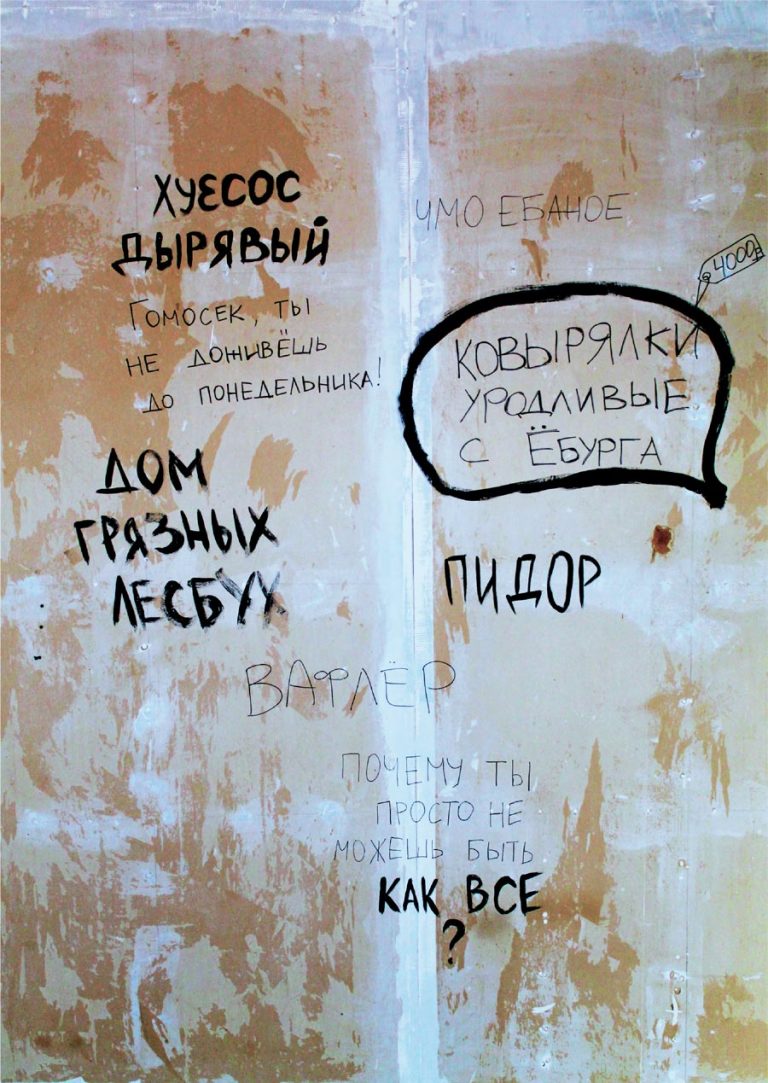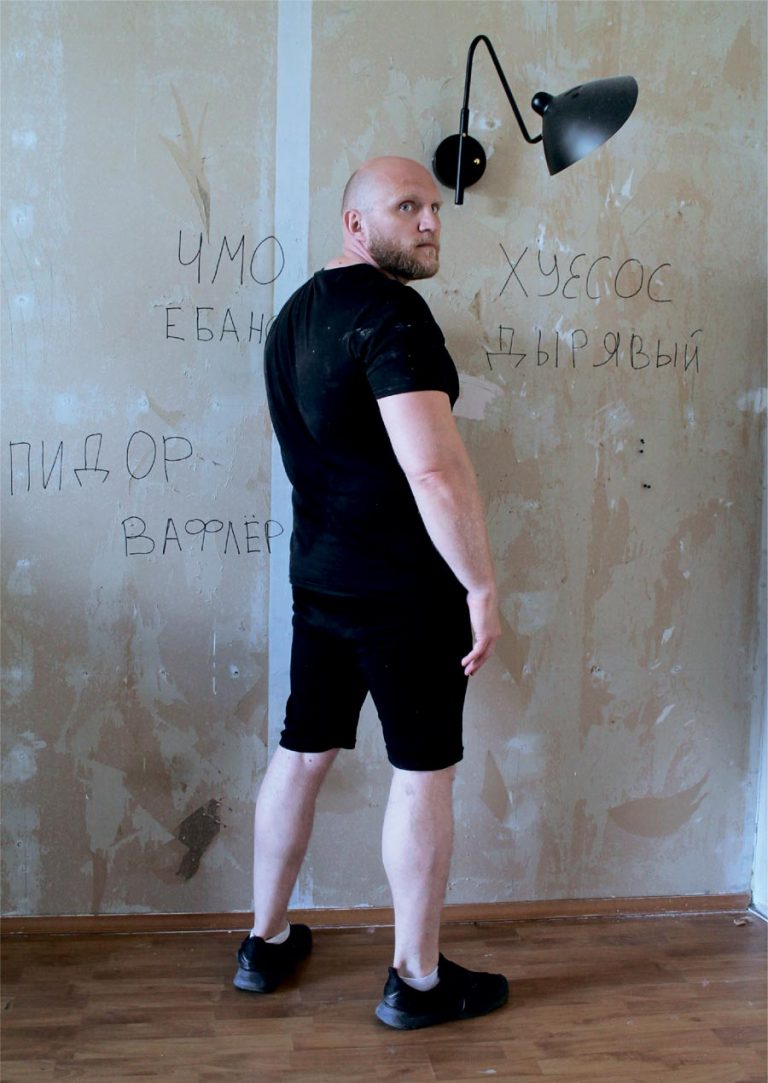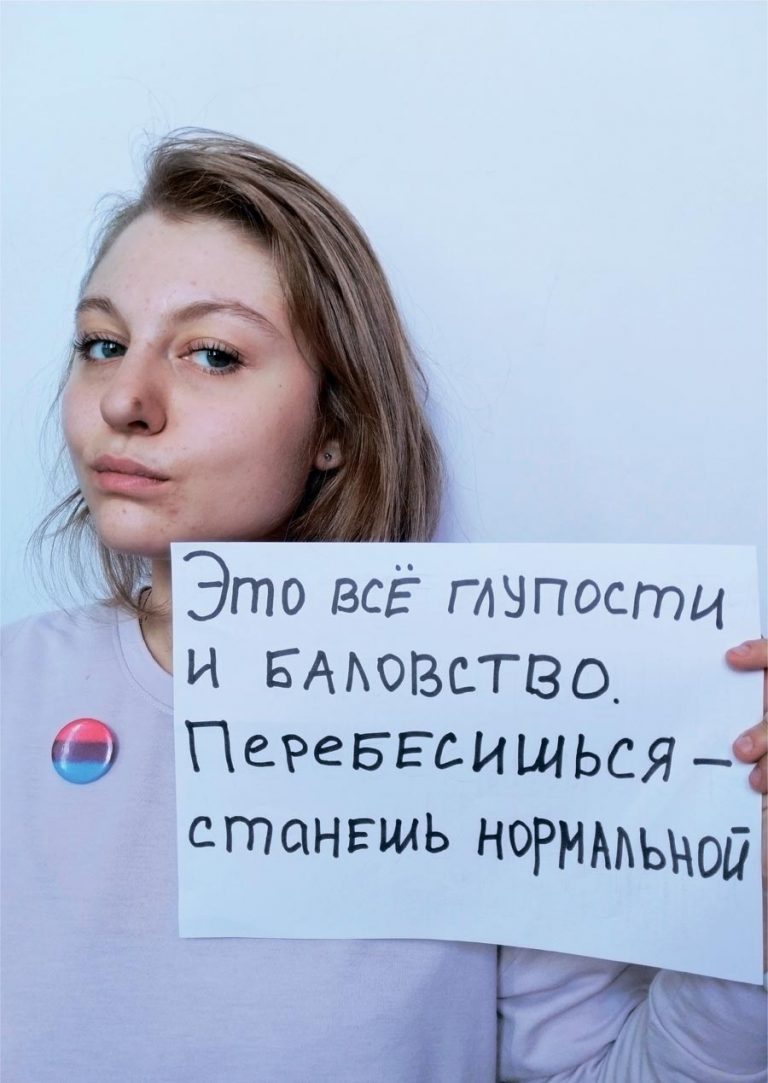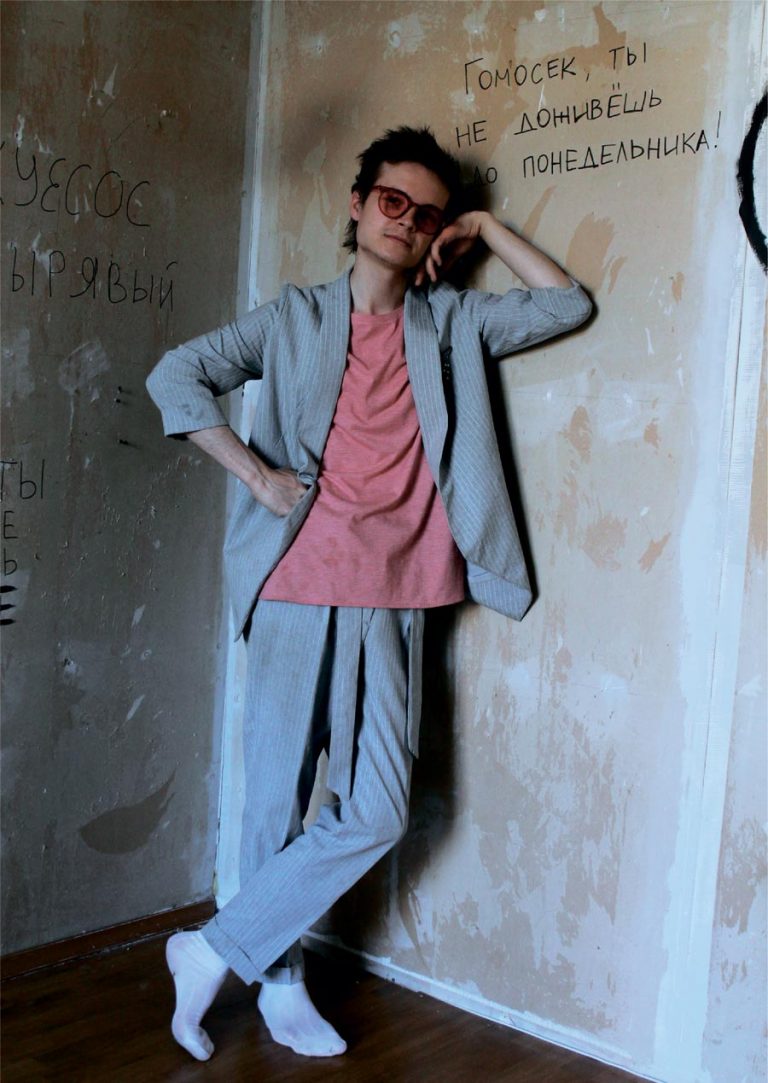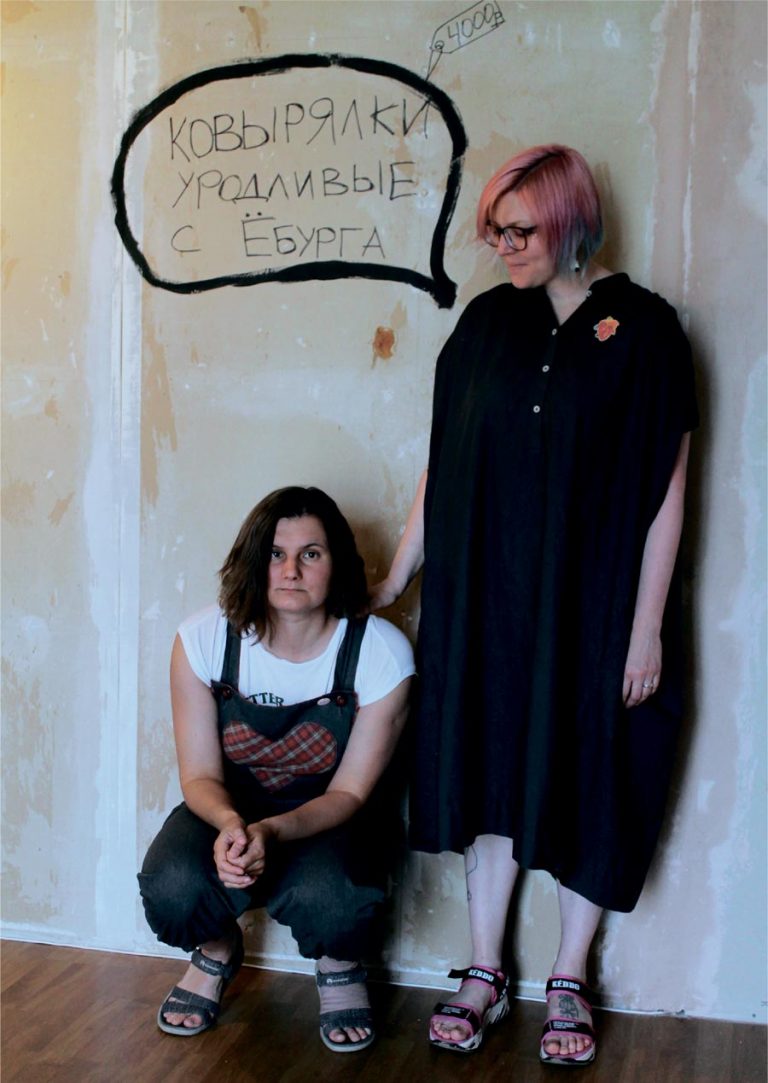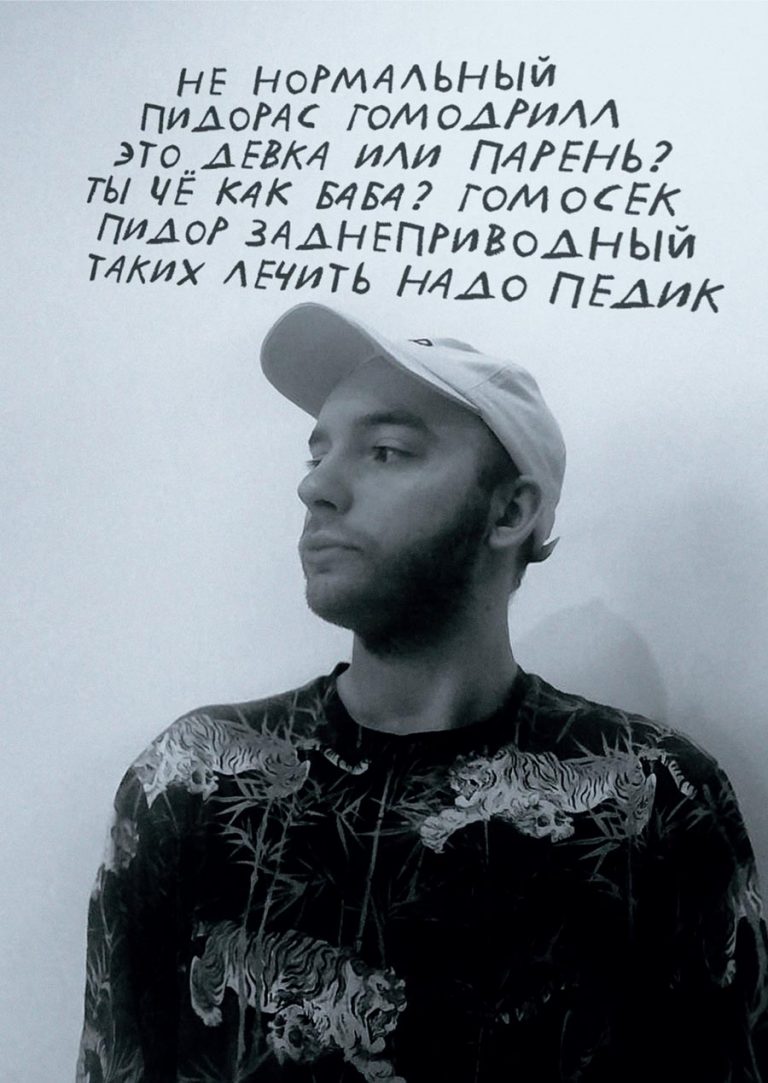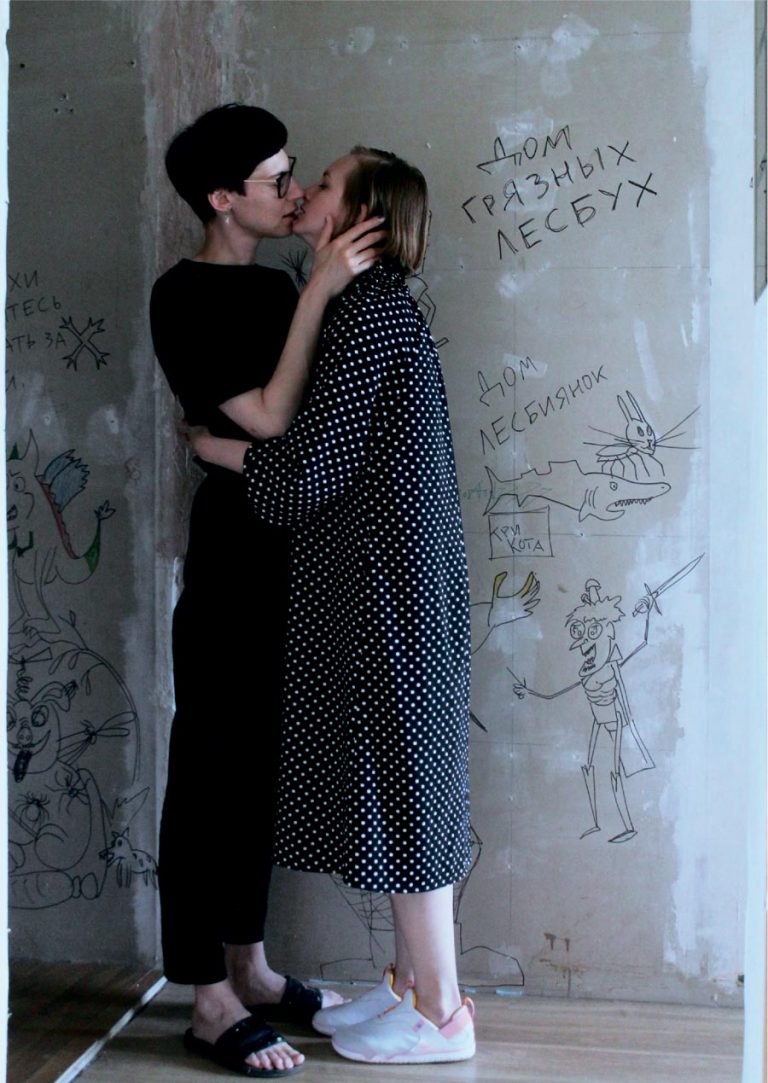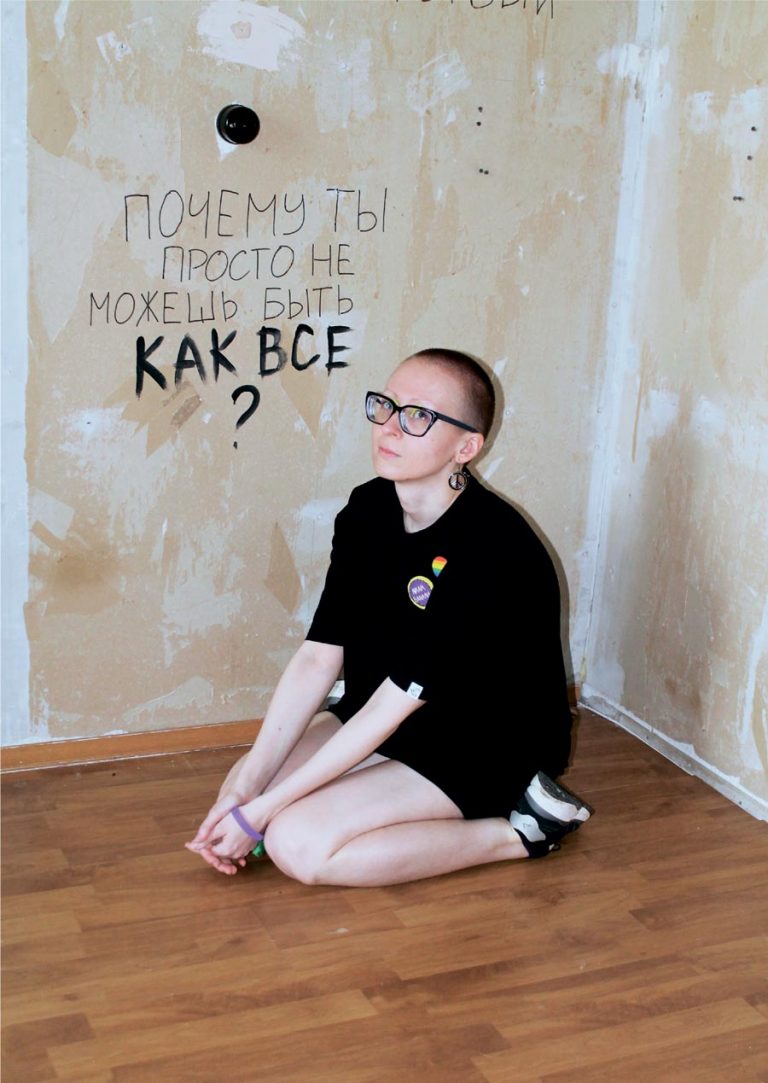WORDS MATTER
a photo project
by Alla Chikinda, Galina Belova, Rita Haak
graphic design, illustrations, art by Katya Chervonnykh
art by Rare.God
translation from Russian by Ludmila Golova
,,
Words are commonly considered to be less important than actions. It is believed that one can say anything, but only what is done after is really meaningful. That is exactly why offensive jokes in our society aren’t thought of as something unacceptable, after all, they are just words.
Rita Haak and Galya Belova were assaulted by Galya’s ex-husband in her own apartment. This incident was the first act of physical violence, and one might assume that this case is an outlier that doesn’t imply anything more serious. However, Rita had been subjected to his offensive remarks and threatening messages more than once. A few days following the attack someone covered the walls of the apartment with drawings and words ‘The house of dirty dykes’. So, it turns out that in this case words are directly connected with actions.
This story is a good opportunity to have a conversation about homophobia and violence which, despite their obvious presence, we prefer to ignore. Rita and Galya decided to use the walls of the apartment as a foundation for a photo project and invited different people to share their stories of pain that can be caused by words.
All participants of the project are people who have faced homophobia and transphobia in the form of verbal abuse. Some of it escalated to physical violence or led to long-term bullying. Regardless, each and every story left a permanent mark on the very souls of those who were on the receiving end.
This project aims to demonstrate that hate speech and other forms of violence are inherently connected. Homophobic, sexist and racist jokes are not ‘just’ jokes, not harmless words. There is always something bigger behind them.
Kostya
“I built a prison for myself”
When I was about 18-19, I was only starting to understand myself. I remember having a crush, I really liked a boy. Without any sexual implications, I just really liked him.
I decided to confess my feelings to him and tell him that I really liked him. He responded by saying “The fuck, Kostyan, are you a fucking faggot?” He told everyone in our group of friends and I pretended I was just playing jokes.
As a result, I shut down emotionally, and for many years after that I was afraid of trusting others or showing my feelings.
I was married for 11 years. My child was 12 when I finally dared to live my truth. For a long time I had been living under pressure from society and my homophobic family. I got married because I’m a real man after all, and the rest is a passing fancy. My mom said: “If I find out one of my children is gay, I will kill them’. So, I decided: ‘Ok, you’ll never find out”.
I’m an athlete, I used to do martial arts and I have a black belt in karate. When you train, there are always some feelings, emotions that float to the surface, and you have to control them. In martial arts they teach you to follow your fear, if you are afraid of something, that’s what you should face. You’re scared of admitting you’re gay – face that.
I’m like Baron Munchausen in that I constantly had to pull myself out of the swamp by my own pigtail. I realised that this was my life, and either I would do something about it, or not. Through trial and error, scandals, and therapy. All alone, without a psychologist, I wouldn’t have made it out.
I built a prison for myself, but in the end I saw that it was of my own making. Of course, some of my relatives fell out. But really important people, my son, my brother, my ex-wife, they accept me. We still have a great relationship with her, we are friends. Those who don’t accept me, well, I simply don’t interact with them.
Anna
“All the negative words and emotions directed towards my bisexuality make me feel like I don’t matter at all”
My sexual orientation is often devalued, both by heterosexual people and by those who belong to the LGBT+ community.
Bisexuality is often invisible. If I’m dating a guy, the society sees me as a heterosexual woman. If I’m dating a girl, they see me as a lesbian.
Moreover, from a very early age, when I first started getting crushes and understanding attraction, everyone around me put it down to fleeting fantasies. They told me that I was young and stupid, that I would get enough of those ‘crazy games’ one day and become normal, which meant that I was not normal.
To this day I often encounter invalidation of my relationships with girls.
They are not taken seriously by the society, and heterosexual men even sexualize them.
Words hurt. Words have consequences, and it’s important to understand that.
Because of the invalidation and invisibility, because of negative words and emotions directed toward my bisexuality I feel like I don’t matter at all.
The words that I have written on the page and phrases of the same ilk make me feel alone, as if nobody in the world understands me. It’s like I am not accepted on either side, neither in the heterosexual part of the society, nor among the homosexual people.
Now that I grew a thicker skin it is easier to deal with that, but when I was a teenager, I was more vulnerable and there was pain and emptiness in my soul, I felt isolated and othered as though I was completely alone, a ‘crazy’ person among others.
Alec
“I hate Mondays”
In the 7th grade, when I was 14 years old, I fully understood who I was, and that is when I had a crush on a classmate. That is also when I got my school nickname, faggot, despite the fact that seemingly nothing had caused it.
All I did was behave and dress the way I wanted and live life to the fullest.
It seems, however, that school bullies didn’t like how happy I was and one day, during recess, they сornered me, beat me up and said: “Faggot, you won’t make it till Monday”.
The whole week, as I was going to school I was terrified and only left the classroom together with my classmates, the boys who didn’t like me much but at least didn’t beat me.
On Saturday, before the day off, the bullies lost patience and stopped me in the hall, among other students, saying: “Stop hiding, you’re gonna get it now”.
At that moment, when I was ready to just fall down on the floor and not move, my classmates, sturdy boys, stood up for me and said: “This is our faggot, and only we can bully him”.
It sounds funny now, this memory, like a bad joke, but then I felt that I had someone to lean on, my school family with whom we didn’t always get along well, and yet, we were together.
Alla and Anna
“I couldn’t understand why a complete stranger hated me so much”
In the winter of 2019 a notorious homophobe took to messaging us. He wanted to threaten us for our activism and sabotage the event we were planning at the time.
He would send us identical text messages almost every day. They contained various insults and threats, ranging from simple unpleasantries to outright obscenities. All of that was sprinkled with rainbow flag, exploding bomb and laughing face emoji.
Alla: “I have never encountered such single-minded bullying and hate before. Actually, it was the first time I faced homophobia in my life. I was scared, anxious and so upset I could cry. I couldn’t understand why a complete stranger hated me so much. I was quite literally shaking every time my phone vibrated, notifying me of yet another message. At some point I blocked that number, but my phone kept on informing me about the messages from it, not showing the messages themselves anymore.
Since Anya is a lawyer, she suggested taking the legal route. This kicked off the proceedings, which took more than two years and are still ongoing. Those included examinations by experts, court hearings and attempts, not all of them successful, to notarize the messages in question. In the end we won both court cases and that person is now under the obligation to pay us a compensation of 2,000 rubles per insult for emotional distress. This means that each phrase will cost him 4,000 rubles and the total sum he will have to pay adds up to 86,000 rubles.”
Andrei
“I was afraid of the mockery and insults of my classmates. It was much easier to get a bad mark”
I faced homophobia at school, around the 5th grade. Very often the insults were based on my appearance: fringe, skinny jeans. It continued after school, too, for example, while walking around the city I used to hear comments behind my back: “You pansy”, “Are you a girl or a boy” and some names starting with Fa..
This greatly impacted me. I was a very shy and closed-off teenager, timid and afraid of expressing myself even a little. I even dreaded speaking in front of the class at school. I was afraid of the mockery and insults of my classmates. It was much easier to get a bad mark.
At 16 I found a job in food service where I met my coworkers who accepted me the way I was and helped me open through giving me support.
Despite that and some changes in my appearance, I still come across homophobic comments sometimes, not only on social media, but also in real life. In the latter case, the comments sometimes escalate to insults or even violence. To illustrate, there is the example of a recent assault which ended in theft, a broken nose, concussion and a criminal case. Considering the homophobic agenda of our state, I was pleasantly surprised when I won the court case. I am grateful to the Resource Center that helped me achieve that result.
Rita
“It’s easier for them to think that I’m a flamboyant dude in bright makeup than that I’m a tall girl with a short haircut”
I have been experiencing homophobia since I was a teenager. First, I got a short haircut and my classmates began to joke that I transitioned. Later I started to hear insulting comments in the street due to how I looked. Men mistook me for a guy when I was just a girl that liked to wear unusual clothes and bright makeup. I was beaten up by soldiers once. The other time a drunk dude accosted me, saying that I’m a fag. I was, in fact, a blonde wearing a blue puffer coat, a fluffy skirt on top of jeans and green mascara. I gently pushed him away and got hit in the ear for that. I fell down and he kicked me in the ribs several times. I still remember those boots and the emptiness in my head. Some people dragged him away. But when he and his mates left and I sat up and started to cry, a woman standing nearby told me that I should blame myself. Who knows what for. The fact is that no one helped me, and this story happened next to the central subway station at 7 pm.
After that there were many instances of verbal abuse, whistling directed at me. Sometimes a shove in the back. All with the same old tagline: you’re a fag.
This led to me being afraid of attending crowded places where people drink or passing by random groups of men in my neighborhood. I don’t want to look into people’s faces in the street where some often try out loud to figure out my gender.
And I always had this thought, is it really easier for them to think that I’m a flamboyant dude in bright makeup than that I’m a tall girl with a short haircut.
I am bisexual. I had my first relationship with a girl at 17. Before this May I hadn’t faced blatant homophobia because of that. But then a person appeared, one who thinks that the word ‘lesbian’ is a slur and tried to harm me, threatened me with murder.
Words can do more than we think.
From homophobic, rude, insulting words a way of thinking is created that contains in itself a place for violence.
Galya
“It’s so weird to hear that word out of his mouth”
My ex-husband has been calling me a dyke for more than a year, since the moment I confessed to him that I am interested in being with girls.
Almost a year ago I admitted to him that I was in love. I thought that we got on well and he would support me in my decision, and for some time he did. But in the fall of 2021 we had a fight and he took my phone and decided to jump out of the window with it, having texted the girl I liked before that. The girl wasn’t aware of my feelings then, by the way. I still don’t know what those messages were about, but when that story unfolded, the word ‘dyke’ made an impression on me.
It’s so weird to hear that word out of his mouth because it’s not offensive to me at all. And in the new story he wrote that word all over the walls of my apartment, as a way of saying goodbye.
I will repaint the walls, but I won’t be able to erase the memories and the hard feelings.
I wish humanity to everyone.
Slava
This phrase out of my mom’s mouth hurts me the most.
Actually, in childhood, before I figured out my own identity, I and others had known that I was different and felt it subconsciously. Because of that, living in a society was pretty difficult.
I’m looking for a job now and during the interviews I make an emphasis on my gender identity first thing. Of course, no one says anything directly, but I can often glean from people’s faces, from their expressions and their choice of words why exactly I was turned down. It’s quite difficult as I’ve been searching for a job for three months already.
Once I called my mom to share my feelings and she asked me: “And what’s stopping you from fitting in? Why can’t you just be like everyone else?“
I think that this phrase of my mom who knows that I am different is what hurts me the most. I am hurt by the fact that people can’t accept that others exist, and they are not the same. They just exist.
